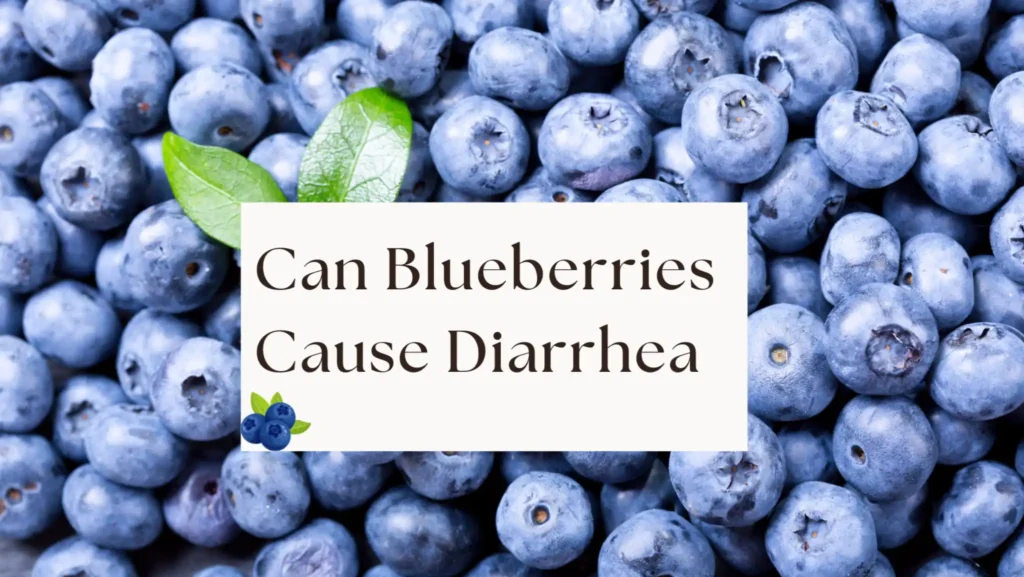Side effects of blueberries are easy to ignore because blueberries are on every “superfood” list. You see them in smoothies, yogurts, and health bowls, so they feel completely safe. In normal amounts, blueberries support heart, brain, and gut health due to fiber and plant compounds.
Table of Contents
ToggleTrouble starts when you eat large portions or when your body has special risks. Then the side effects of blueberries can cause allergies, stomach pain, loose stools, or flare-ups of existing gut problems. Some people also face rare skin or breathing reactions, which align with typical food allergy patterns.
You get the most benefit when you understand where the side effects of blueberries come from, how to spot warning signs, and how to adjust your serving size. Medical sources agree that blueberries are helpful for most people, yet they still advise care in people with allergies, sugar absorption problems, or kidney issues.
Blueberry Allergy Symptoms
Allergy is one of the most serious side effects of blueberries , even though it is not very common. A true allergy happens when your immune system treats blueberry proteins as a threat. That reaction can cause hives, swelling, stomach pain, or trouble breathing, similar to other food allergies.
Common Signs Of Blueberry Allergy (Itching, Swelling, Hives)
Symptoms of blueberry allergy cover a range of reactions. You may notice tingling or itching in your mouth, red, itchy skin, hives, or swelling of lips, face, or tongue. Some people report nausea, vomiting, or diarrhea after eating blueberries, which matches general food allergy patterns in clinical guidance.
If symptoms show up every time you eat blueberries, you should treat that as a likely allergy rather than a random upset stomach.
Difference Between Allergy Vs Intolerance
Allergy and intolerance are different problems. Allergy involves the immune system. You eat blueberries, and your immune system releases histamine, which can cause rash, swelling, or breathing issues. Intolerance mainly affects your gut. You get gas, cramps, or loose stools, but you do not get hives or throat swelling.
Both can feel unpleasant, and both are side effects of blueberries , but the risk level is not the same. Allergy can become dangerous in a short time. Intolerance is usually uncomfortable but not life-threatening, although it can still affect daily life.
Oral Allergy Syndrome From Blueberries
Oral allergy syndrome (OAS) is a special type of food allergy where your mouth and throat react to certain raw fruits. Medical groups such as the AAAAI and Cleveland Clinic explain that people with pollen allergies sometimes react to fresh fruits because the proteins look similar to pollen proteins.
When OAS involves blueberries, you may feel itching on your lips, tongue, or throat soon after you eat them. Mild swelling around the mouth can also occur. These side effects of blueberries often stay limited to the mouth region and tend to be milder than a full-body allergy, though rare severe cases have been reported.
Who Is At Higher Risk Of Blueberry Allergy?
You face a higher risk of blueberry allergy symptoms if you already react to other berries, have strong pollen allergies, or have a history of food allergy or asthma. Allergy specialists note that cross-reactions between pollens and fruits are common in OAS, and berries are often part of that pattern.
For you, even small portions of blueberries can bring noticeable side effects, such as itching or rash. Research on blueberry-specific allergy is limited; allergists often use general fruit allergy rules when they guide patients.
When To Seek Medical Attention
You should get urgent medical help if you notice swelling of the tongue or throat, trouble breathing, chest tightness, or feeling faint after you eat blueberries. These warning signs match severe food allergy reactions.
If your reactions are milder, such as repeated hives or stomach pain, you should still speak with a doctor or allergist. They can check whether the side effects of blueberries in your case come from a true allergy, intolerance, or another unrelated cause.
Can Blueberries Cause Diarrhea
If you notice loose stools after a large smoothie or snack, blueberries could have caused diarrhea , especially if you eat big portions or have a sensitive gut. Blueberries contain fiber, fructose, and small amounts of sorbitol, all of which can affect bowel habits.
This does not mean blueberries are bad. It means the side effects of blueberries appear when the dose and your own gut tolerance do not match. Doctors often stress that reactions vary widely from person to person.
High Fiber Load Causing Loose Stools
One cup of blueberries gives around 4 grams of fiber, which is helpful for most people. If you usually eat very little fiber and suddenly eat large bowls of berries, your gut bacteria have to adapt. Gas and loose stools are a common response in that phase.
This type of reaction is one of the most frequent side effects of blueberries in healthy people. It tends to settle if you slowly raise your fiber intake and drink enough water.
Sorbitol And Natural Sugars Triggering Diarrhea
Some people cannot absorb fructose and other short-chain sugars well. Studies on fructose malabsorption show that unabsorbed sugar can pull water into the gut and feed bacteria. That process causes bloating and diarrhea in many patients.
Blueberries contain fructose and a little sorbitol, which can add to this effect in sensitive people. In that group, the side effects of blueberries can appear even with medium-sized servings, while others feel fine.
Diarrhea From Unwashed Or Contaminated Berries
If you do not wash blueberries, germs or pesticide traces on the skin can irritate your gut. Infection-related diarrhea can follow, similar to what happens with other unwashed fruits. Health agencies like the CDC stress careful washing of fresh produce to lower this risk, even though data for blueberries alone are limited.
Here, the problem is not the natural side effects of blueberries themselves, but the contamination on the outside. Rinsing under running water before eating is a simple way to protect yourself.
How Many Blueberries Trigger Symptoms?
There is no single number that fits everyone. Some people can eat more than a cup with no problem. Others feel the side effects of blueberries at half a cup, especially if they have IBS or known sugar absorption problems. Clinical guidance on fructose malabsorption suggests that smaller, spaced servings are easier to handle.
If you suspect blueberries can cause diarrhea for you, keep a simple food and symptom diary. That gives your doctor clearer data to work with.
Ways To Reduce Diarrhea Risk
You can lower these side effects of blueberries by eating smaller portions with meals, not alone in a huge smoothie. Adding yogurt or oats provides protein and starch, which slows digestion and often makes the fruit easier to handle for people with mild gut issues.
Blueberry Side Effects On Stomach
Not all problems reach the level of diarrhea. You may first notice blueberry side effects on the stomach, such as bloating, cramps, or a “heavy” feeling after eating large servings. These symptoms match general reports about gas-forming foods, especially when fiber intake changes quickly.
Bloating And Gas From Excess Fiber
Fiber feeds your gut bacteria. As they break it down, they release gas. If you jump from low-fiber to high-fiber in one day, you may feel tightness, pressure, and extra gas. This pattern matches what many digestive experts see when people improve their diet very quickly.
Stomach Pain Due To Fructose Malabsorption
In fructose malabsorption, your small intestine does not absorb fructose well. The extra sugar enters the large intestine, where it pulls in water and feeds bacteria. This combo leads to pain, gas, and loose stools in many patients, as shown in several clinical reviews.
If you live with this condition, even moderate amounts of blueberries can have side effects on the stomach . Doctors often suggest testing and a guided diet rather than guessing alone.
Acid Reflux Or Heartburn From Blueberries
Blueberries are mildly acidic. For someone with GERD, any acidic or large-volume meal can add to reflux. Harvard medical advice lists acidic foods as common triggers, though it does not single out blueberries by name.
So, if you get heartburn every time you drink a large blueberry smoothie at night, treat that as one more of the side effects of blueberries for your body.
Stomach Irritation If Eaten On An Empty Stomach
Big bowls of fruit on an empty stomach may move through your gut faster. Fiber and acids hit the lining without any protein or fat to slow them down. You may feel cramps or urgent stools soon after. Clinicians often see this pattern with fruit-heavy breakfasts, even though formal research on empty-stomach blueberries alone is limited.
In your case, eating a smaller amount with yogurt or oats helps mitigate the side effects of blueberries .
Safe Portion Sizes For Sensitive Stomachs
For a sensitive gut, starting at a quarter to half a cup with meals is a safer approach. Nutrition guidance from major clinics suggests similar serving sizes for fruit in general, with gradual changes rather than sudden jumps. If that amount sits well for two weeks, you can review it with your doctor or dietitian.
Digestive Issues From Blueberries
Blueberries are “great for digestion” for many people, but digestive issues from blueberries are also common when the portion is too large or your gut is sensitive. The same fiber and natural sugars that help some people can upset you if your gut moves too fast or too slow. These problems are one of the most underrated side effects of blueberries .
Constipation In Low-Hydration Conditions
Blueberries give fiber that holds water in your stool. If you eat a lot of blueberries but drink very little water, the fiber can turn your stool thick and hard. That makes it harder to pass, so you feel full, tight, or blocked. For you, this is one of the digestive issues from blueberries , even though fiber itself is not harmful.
Children, older adults, and people who already have slow bowels feel this more. When you notice this pattern, you do not need to stop eating blueberries. You need more water and a slower rise in fiber. That reduces the side effects of blueberries while keeping the benefits.
Diarrhea From Overconsumption
On the other side, very high portions can pull more water into your gut and speed movement, especially if you already have a loose stool pattern.
If you drink a blender full of berry smoothie on top of other fruit, you may rush to the toilet soon after. This is another one of the digestive issues from blueberries . So, the serving is the first thing to adjust. You can still enjoy them in smaller amounts with food.
Role Of Tannins And Antioxidants In Gut Discomfort
Blueberries are rich in plant chemicals called polyphenols and tannins. These help protect your cells from damage. In people with a sensitive lining, a high load of these chemicals can cause mild discomfort and cramps or nausea. That kind of reaction is a lesser-known side effect of blueberries .
Clinical papers on tannins do not show clear harm for healthy people. The concern is mainly when you add a large amount very quickly or when you already live with an active gut disease. In those cases, changing dose and cooking style can cause digestive issues from blueberries .
Blueberry Skins And Seeds Affecting Digestion
If you have irritable bowel syndrome or inflammatory bowel disease, rough fruit skin can scratch an already sore lining. That can lead to more cramps and gas in your case.
You might notice fewer digestive issues from blueberries when you eat them cooked in porridge instead of raw by the handful. Heat softens the skin and may make the texture easier for you to handle.
How To Make Blueberries Easier To Digest
You can reduce this group of side effects of blueberries with a few simple habits. Eat smaller amounts at a time, combine them with oats or yogurt, and drink water with your snack. If you know that your gut reacts to several fruits, a dietitian can help you test your own limit for blueberries within your total fruit allowance.
Too Many Blueberries Side Effects
Healthy food can still cause trouble when the portion is too high. Too many blueberries’ side effects do not stop at the gut. They can touch blood sugar, weight, kidney stone risk, and sometimes your skin or medicine plan. The details depend on your health history.
Blood Sugar Spikes From Excessive Intake
Blueberries have natural sugar and do affect blood glucose. Studies in people with and without diabetes suggest that moderate portions fit well in a balanced diet. Large portions, especially in juice or sweet smoothies, can still raise your sugar more than you expect.
So for you, one of the side effects of blueberries can be higher after-meal sugar, even though berries are often seen as “safe.” If you monitor glucose, you may notice that pattern on your meter.
Potential Interaction With Diabetes Medications
If you take diabetes drugs, any change in total carbohydrate intake matters. You may eat more blueberries because you think they are “free calories.” Over time, that can affect your numbers and make your dose feel off.
Doctors usually advise people with diabetes to count fruit portions like any other carbohydrate.
Kidney Stone Concerns From Oxalates
Blueberries contain oxalates, which can join with calcium in the urine in people who form calcium oxalate stones. Research shows that their oxalate level is moderate compared with very high foods, but stone clinics still advise some patients to track all oxalate sources.
If you have a history of kidney stones or chronic kidney disease, you should limit large berry loads.
Weight Gain From Calorie Overconsumption
One cup of blueberries is not very high in calories. The problem appears when you add several cups every day, plus sugar, cream, or pastry. Over months, that extra energy can still push the weight up. Watching total portions and toppings keeps this risk small.
Skin Reactions From Overconsumption (Rare)
A few people notice flushing, itching, or mild rash when they eat large blueberry servings, even without clear blueberry allergy symptoms . Specialists think this may relate to natural food histamine or salicylate sensitivity.
Research here is limited, so you and your doctor must judge your own pattern. If symptoms repeat, they count as one more of the side effects of blueberries for your body.
Tips To Avoid Blueberry Side Effects
You do not need to drop blueberries. You need a smart way to fit them in your day so that the side effects of blueberries stay small and you keep the benefits.
Recommended Serving Size
For most adults, a common safe goal is about half to one cup of fresh blueberries per day, inside your total fruit intake. People with kidney, gut, or sugar issues may need a different amount set with their doctor. Keeping within your range lowers blueberries’ side effects .
Pair Blueberries With Yogurt/Oats To Reduce Stomach Issues
When you mix blueberries with plain yogurt, kefir, or oats, the protein and complex carbs slow sugar entry into your blood. This simple habit often reduces gas, cramps, and other side effects on stomach that appear after huge fruit-only snacks.
Always Wash Blueberries To Avoid Contamination
Rinse blueberries under running water before eating. You remove surface dirt and many germs and cut the risk that your digestive issues from blueberries come from bacteria or chemicals on the skin instead of the fruit itself.
Choose Fresh Over Processed Berries
Whole fresh or frozen berries keep their fiber. Juices and sweet sauces remove fiber and add sugar. Those products can give stronger side effects of blueberries on blood sugar and weight, even if the label looks healthy.
How To Introduce Blueberries Slowly Into Diet
If you rarely eat fiber, start with a few spoonfuls a day and slowly move toward your target portion over several weeks. This gentle rise lets your gut bacteria adapt and prevents sharp digestive issues from blueberries, like gas bursts or loose stools.
FAQ
How Many Blueberries Per Day Is Safe For Most People?
For most healthy people, half to one cup per day fits well inside a balanced diet and keeps the side effects of blueberries low. If you have medical conditions, your doctor should set your personal limit.
Can Blueberries Irritate The Stomach If Eaten On An Empty Stomach?
Yes, large servings on an empty stomach can cause cramps, gas, or loose stools for some people. Those kinds of blueberry side effects on the stomach are more likely if you already have a sensitive gut.
Do Blueberries Cause Gas More Than Other Fruits?
Blueberries can cause gas because of fiber and natural sugars, but many people tolerate them better than some other fruits. Still, if your gut is sensitive, digestive issues from blueberries may feel quite strong.
Can Blueberries Worsen IBS Or Sensitive Gut Conditions?
Yes, big servings may worsen bloating, cramps, or loose stools in IBS, especially in people who struggle with fructose. Lower, spread-out portions help reduce digestive issues from blueberries in these conditions.
Are Frozen Blueberries Easier On Digestion Than Fresh Ones?
Some people find thawed or cooked frozen berries gentler than firm fresh ones, since the texture is softer. For others, digestive issues from blueberries feel the same. You need to test your own response.
Can Unripe Blueberries Cause Stomach Problems?
Unripe blueberries are more sour and can irritate your stomach more. If you already get blueberry side effects on your stomach , unripe berries may bring stronger cramps or nausea, so ripe fruit is usually a better choice.
Do Blueberries Trigger Acid Reflux For Some People?
Yes, large or very acidic servings can raise reflux in people with GERD. If you notice chest burning after big portions, treat that pattern as a side effect of blueberries for your body.
Can Blueberries Cause Headaches Or Migraines In Sensitive Individuals?
A few people with histamine or salicylate sensitivity report headaches after heavy berry intake. Evidence is limited, so doctors judge case by case, but it still counts as too many blueberries .
Do Blueberries Interact With Blood Pressure Medications?
Blueberries do not usually clash with common blood pressure pills. Problems come more from sudden diet shifts. If you change your intake a lot while on treatment, you should still watch for new side effects of blueberries .
Can Blueberries Thin The Blood Because Of Vitamin K Levels?
Blueberries contain some vitamin K, but not as much as leafy greens. If you take blood thinners, keep your blueberry intake steady. Sudden large changes could affect your test results and may be indirect side effects of blueberries .

This article is medically reviewed by Dr. Nivedita Pandey, Senior Gastroenterologist and Hepatologist, ensuring accurate and reliable health information.
Dr. Nivedita Pandey is a U.S.-trained gastroenterologist specializing in pre and post-liver transplant care, as well as managing chronic gastrointestinal disorders. Known for her compassionate and patient-centered approach, Dr. Pandey is dedicated to delivering the highest quality of care to each patient.









